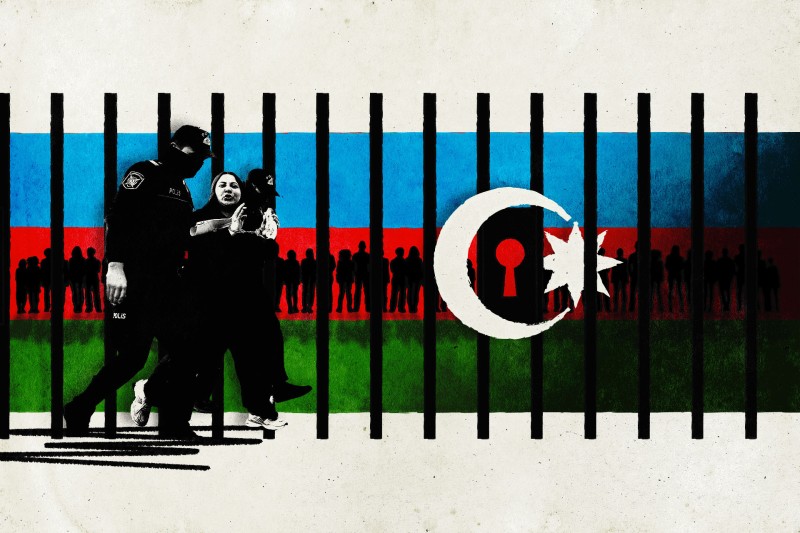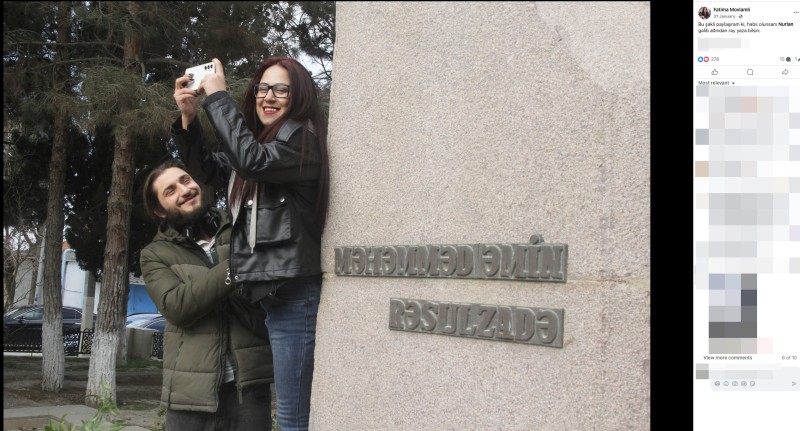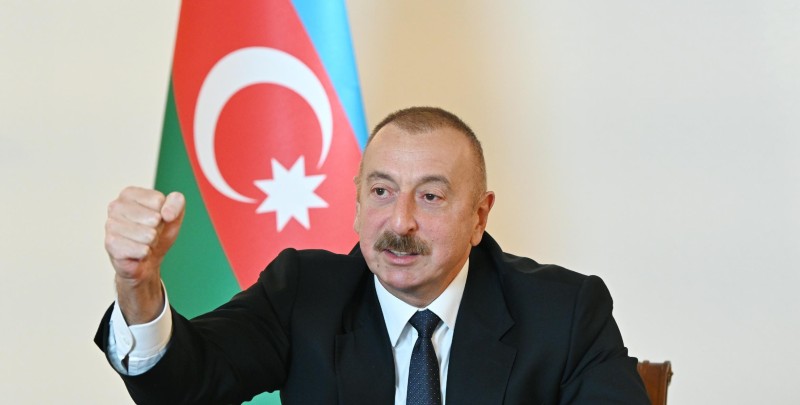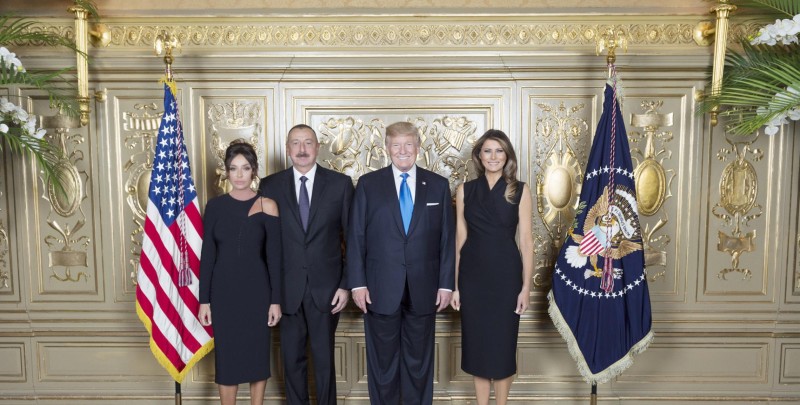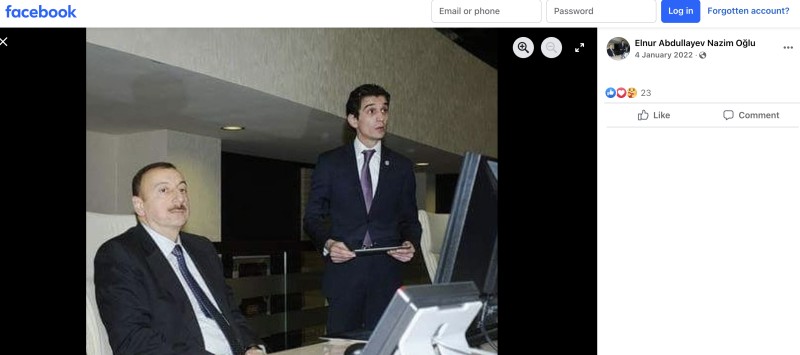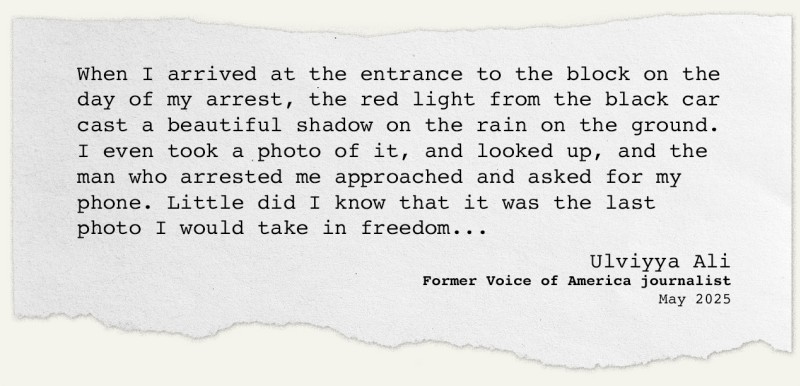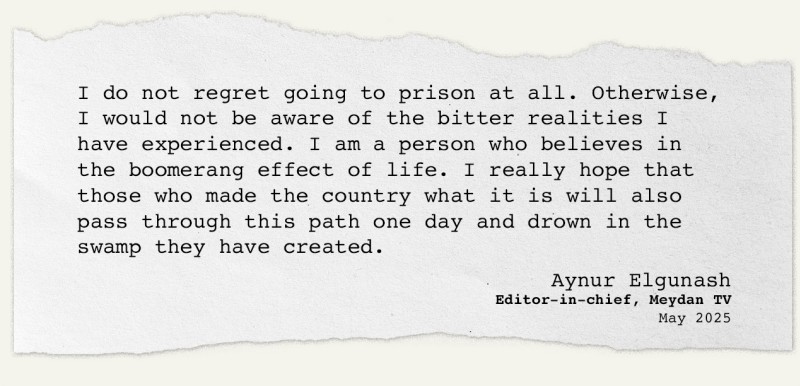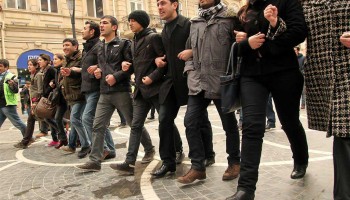Fatima Movlamli knew the police would come for her.
For months, the young Azerbaijani activist-turned-journalist had been documenting the plight of her colleagues as they were smeared by pro-government media, detained, and hauled before the courts on charges of “currency smuggling."
So Fatima prepared. The 24-year-old gave access to her Facebook account to friends abroad and recorded a one-minute video to be uploaded when the inevitable happened.
It went live on February 28, 2025 — the day she was arrested and became the 26th victim of an 18-month purge on Azerbaijan’s independent media.
Fatima — who had been targeted before by authorities after gaining fame as a teenage activist for her one-woman protests against Aliyev — looked straight at the camera and spoke to it defiantly.
“If I had known that the place I would go to is prison, that all independent journalists would be branded as smugglers, nothing I have done so far would change,” she said, promising to go back to reporting “the first day I get out.”
Then, with a grin, she blew a kiss to the camera: “Take care of yourselves — we will see you in the next few years!”

Since then, two more journalists have been arrested, bringing the total number of detained media workers to 28. They include managerial staff from media outlets and senior figures from two journalism schools.
The unprecedented crackdown has effectively wiped out independent local journalism.
Independent media in Azerbaijan and international rights groups have accused the government of detaining the journalists because of their work and creating a regulatory environment that makes it almost impossible for them to operate legally.
Rachel Denber, deputy director of Human Rights Watch’s Europe and Central Asia Division, described “the speed and comprehensiveness” of the current crackdown on journalists in Azerbaijan as the greatest since the country’s independence from the Soviet Union in 1991.
Reporters Without Borders’ latest World Press Freedom Index, released in May 2025, ranked Azerbaijan 167th out of 180 countries, citing the “new wave of fierce repression against the country’s last remaining journalists.”
Pro-government media have echoed the message from authorities, airing allegations that journalists received illicit funding and regularly doxxing them by publishing private information about them, including phone messages, personal documents, and surveillance camera footage.
It’s a tactic Fatima is already familiar with. In April 2019, intimate photos and videos of her were leaked online. She believed that they were taken from her phone when she was taken into custody, beaten, and forced to hand over her password. She had also been selected as a target of spyware, as reported by OCCRP at the time.
Prior to her arrest in February, Fatima had been freelancing for news outlets including Meydan TV — OCCRP’s Azerbaijani member center — helping to keep up coverage after its entire in-country staff were detained.
The online outlet’s hard-hitting reporting on corruption and human rights in Azerbaijan had long made it a target of official harassment. Its website is blocked there, but it has a huge following on social media, including almost 1 million followers on Instagram and 640,000 subscribers on YouTube. (Azerbaijan has a population of 10 million).
Though based abroad for years, it had managed to keep a team of journalists in Azerbaijan until a few months ago, including editor-in-chief Aynur Elgunash.
In a recent letter she wrote from prison, published by Meydan TV, Aynur described Azerbaijan as “gradually turning into a swamp, and this swamp is busy swallowing people.”
The outlet’s exiled management told OCCRP that it now has no employees working in the country for the first time in its 12-year-history.
Meydan TV is known for its highly engaged local audience; many of its stories have been prompted by reader tips. Now, while the outlet continues to publish from exile, it can no longer fully engage with readers to highlight the social issues they care about. Without reporters in the field, fact-checking has also become nearly impossible, made worse by stonewalling from state agencies, the outlet’s management said.
Meydan TV freelancer Nurlan Gahramanli (left), also detained, and Fatima Movlamli.
Weeks before she was detained, Fatima shared a smiling photo on Facebook of herself and fellow Meydan TV freelancer Nurlan Gahramanli, also known as Nurlan Libre, perched next to a monument dedicated to Mahammad Amin Rasulzade, a founding figure of Azerbaijani democracy in the early twentieth century.
“I’m sharing this photo so that, if I get arrested, Nurlan can come and comment below,” Fatima’s post read.
Nurlan never had the chance. Just before Fatima’s arrest, he was also detained on currency smuggling charges. He is now awaiting trial.
Detained Journalists Could Face Up To 12 Years In Prison
Azerbaijan has long been one of the most challenging places in the world for independent media, and the government has previously jailed journalists on charges that rights advocates have described as bogus and politically motivated.
But the muzzling of media has escalated rapidly since late 2023.
The purge kicked off in the run-up to presidential elections in February 2024, which Aliyev won with more than 92 percent of the vote.
As Aliyev eased into his fifth consecutive term, the targeting of journalists gathered pace.
Meydan TV, Toplum TV, Abzas Media, and Kanal 13 all now operate entirely from exile, with no staff working in Azerbaijan. The country’s most influential independent news outlet, Turan News Agency, opted to shut down entirely in February.
All of those outlets had run stories exposing corruption and rights abuses linked to the Aliyev regime.
President of Azerbaijan Ilham Aliyev.
Other smaller independent media outlets have either stopped operating or have vastly reduced their output since their staff have been detained.
Those still working for the publications from abroad choose to remain anonymous, fearing government retaliation against family members who remain in the country.
Of the 28 journalists and other media workers arrested in the past 18 months, two have been convicted and jailed, 15 are currently on trial, and the rest are awaiting trial.
The charges against them often relate to allegations that they brought foreign currency into the country without declaring it, either in the form of hard cash or in grants from abroad. Such charges can lead to up to eight years in prison. Some of the detained face extra allegations including tax evasion and money laundering, which carry sentences of up to 12 years. All have denied the accusations against them.
Conditions in Azerbaijan’s jails are notoriously harsh. In July 2024, Abzas Media published a letter from its director, Ulvi Hasanli, alleging “systematic torture” in the prison where he is being held while he stands trial in the country’s capital, Baku. “Torture continues every week, sometimes every day. Sometimes, one person and sometimes 10-15 people are beaten at once,” he wrote.
That same month, the Council of Europe’s Committee for the Prevention of Torture criticized Azerbaijani authorities’ “continuing lack of action” to end torture in its prison system.
“Behind these charges, these journalists have been arrested for their journalistic work,” said Jeanne Cavelier, head of Reporters Without Borders’ Eastern Europe and Central Asia desk.
Azerbaijan’s Presidential Administration did not respond to a request for comment.
Foreign Media Also Targeted
Crackdown has closed the door on international outlets.
Aliyev, Trump and “The New World Order”
Since 2014, Azerbaijan has tightened legal restrictions on foreign donors to local NGOs, leading to the introduction of new layers of bureaucracy and approval processes for grants from outside the country. Independent media outlets have suffered as a result, since many are set up as NGOs that receive grants from abroad.
Denber of Human Rights Watch said the legislation had made it “virtually impossible” for independent media outlets to operate legally. The legislation “leaves many opportunities for the authorities to arbitrarily withhold approval [for grants],” she said.
To Aliyev, such NGOs are part of a foreign-backed “money smuggling” network designed to undermine the state. At an international forum held in Baku in April, Aliyev praised the success of Azerbaijan’s crackdown on them.
“So-called grants provided to so-called local NGOs — actually the branches of the opposition — now have to be registered, and it is very difficult to smuggle money here,” Aliyev told the audience, though he bemoaned how targeting such “smugglers” was perceived from the outside.
“When our law enforcement institutions bring these money smugglers to justice, they start accusing us of doing undemocratic things,” he said.
In the Facebook video posted on her arrest, Fatima Movlamli pointed to the irony that journalists were being cast as smugglers by Aliyev, whose regime has massively enriched his family and inner circle, as consistently exposed by investigative reporters. He was, she said, “the smugglers’ patron.”
At the Baku forum, which was titled “Facing A New World Order” and brought together representatives from more than 44 countries, Aliyev praised U.S. President Donald Trump’s freezing of aid to media that have called out repressive regimes like Aliyev’s — and encouraged him to go further.
“What President Trump started to do is very promising, but I think he should not stop,” Aliyev told the audience.
“You should go deeper. Human Rights Watch, Freedom House, Amnesty International, Transparency International — all this infrastructure of his political enemies must be totally rendered dysfunctional,” he added.
From left to right, Azerbaijan's First Lady Mehriban Aliyeva, Azerbaijan's President Ilham Aliyev, U.S. President Donald Trump and First Lady Melania Trump.
In his first 100 days in office, Trump dismantled the U.S. government's main overseas aid agency, USAID – which he said was run by “radical lunatics” – freezing billions of dollars in global aid projects, including an estimated $268 million to support independent media around the world. (OCCRP's parent organization has filed a lawsuit against the Trump administration challenging the funding freeze.)
Trump also forced the shutdown of international news services including Voice of America by withdrawing funding. VoA and other U.S.-funded media targeted by Trump, such as Radio Free Europe/Radio Liberty, often provided the only alternatives to state-run media networks in undemocratic states.
Surveillance And Smearing Used To Target Critical Journalists
In parallel with Azerbaijan’s crackdown on independent journalists, pro-government media have waged a campaign that reinforces allegations of illegal funding, sometimes publishing what they claim are private conversations involving the accused or their friends and family.
Journalists targeted said that although some of the private communications and footage shown in the reports may have been fabricated, some appeared to be genuine, raising questions about how they were obtained.
Reports from Baku TV, a prominent pro-government outlet, have included what it said were screenshots of text and audio messages between Meydan TV journalists on Signal and Slack.
Another pro-government media outlet, Qafqazinfo.az, presented a montage of what it said were documents including grant project proposals and a freelance contract, mainly related to Toplum TV and one of its journalists.
Azeri-Press Agency (APA) published screenshots which it alleged showed private calls and messages between a journalist in Azerbaijan and Meydan TV journalists operating abroad, as well as personal information allegedly belonging to Meydan TV freelancer Nurlan Gahramanli. That report was soon followed by Nurlan’s arrest.
Meydan TV’s management told OCCRP they believed the genuine material used in the pro-government takedowns of the outlet’s journalists may have been obtained “under duress.”.
“Our journalists have been subjected to police brutality and threats in attempts to gain access to their electronic devices,” they alleged.
An Abzas Media representative told OCCRP that local law enforcement had been providing material to pro-government media to “defame journalists” and “discredit them in the public eye.”
Media freedom advocates also raised concerns about how the authorities and pro-government media would have obtained such private information.
OCCRP reported in 2021 on the targeting of dozens of Azerbaijani journalists by Pegasus spyware. London-based NGO Media Defence, which is providing legal help to several detained Azerbaijani journalists, has since filed applications to the European Court of Human Rights on behalf of a number of victims, alleging the state violated their privacy.
“Whether [the authorities] secured it through hacking their phones, through monitoring them, through surveilling them in other ways, I think in combination, all of this has a very serious impact on the way in which journalists conduct their activity,” said Pádraig Hughes, legal director of Media Defence.
Baku TV, APA, and Qafqaz did not respond to requests for comment.
Who Controls The Media in Azerbaijan?
In its latest report, RSF said that “virtually the entire media sector is under official control” in Azerbaijan.
“No independent television or radio is transmitted from within the country, and all print newspapers with a critical stance have been shut down,” the report said.
The government owns three television stations, including AzTV, and a news agency called Azertag.
But there are also dozens of privately owned pro-government outlets — and a lack of transparency requirements means details about who controls them are not publicly recorded. Azerbaijan’s government banned public access to company ownership information in 2012.
Baku TV, for example, is part of a holding company called Global Media Group (GMG), which also controls several other pro-government media outlets in Azerbaijan — including Report News Agency and the news website Oxu.Az — as well as Haber Global TV in neighboring Turkey.
But public records do not show who owns GMG.
According to publicly available documents registered with Azerbaijan’s tax authorities, GMG’s legal representative and board chair is a former state transport ministry official called Elnur Abdullayev.
His Facebook page shows him with President Aliyev on two occasions. Aliyev awarded him an honorary diploma in 2020 for “services in the development of mass media in the Republic of Azerbaijan.”
In May 2024, GMG became a signatory to the U.N. Global Compact, a voluntary initiative in which businesses pledge to abide by sustainability principles, including human rights. The pledge was signed by Abdullayev.
An email sent to Abdullayev via GMG went unanswered.
President Aliyev (left) and Elnur Abdullayev (right).
Azeri-Press Agency (APA) is also part of a holding company, APA Group, which controls a range of news websites in Azerbaijan and whose ultimate ownership is unknown.
In a 2016 interview about press freedom, APA Group’s CEO Vusala Mahirgizi told BBC News Azerbaijani that APA could write about any issues it wished, and its journalists had no problem obtaining official documents.
“We have access to investigation statements, testimonies from closed court sessions, and information presented during preliminary investigations, all of which we publish,” said Mahirgizi. “We do not face any pressure or obstacles in this regard.”
For media now forced into exile, the story is very different. Meydan TV and Abzas Media both said they were now relying on the courage of citizen journalists to supply information for their coverage.
Detained, But Not Silenced
While local newsrooms are now empty, exiled publications are ensuring that their detained staff still have a voice, publishing their statements, court testimony and letters from prison, which all strike a defiant note.
“We knew that we would incur the wrath of Ilham Aliyev because of our work,” said the detained director and founder of Abzas Media, Ulvi Hasanli, at a court hearing in January. “However, that did not deter us.”
In a statement from prison in May, Meydan TV’s staff also said they were determined not to be silenced.
“Those who believe they have silenced us by throwing us behind bars are unaware of the liberating power of prison. We no longer have anything to fear — we have been arrested, and from here, our voices will rise louder, will be heard further,” they said
Journalists’ letters from prison echo that defiance – combined with gallows humour and mournful memories of life outside.
Former VoA journalist Ulviyya Ali wrote poetically of her final minutes of liberty in a letter published in May by Meydan TV:
But her instincts to record what is happening around her have not been stamped out in prison. “What I miss the most is journalism, and of course music. I hum to myself sometimes. When something interesting happens on camera, it's a pity that I can't immortalize it with a photo. But I write down everything that happens,” she wrote.
Aynur Elgunash, Meydan TV’s editor-in-chief, bemoaned the terrible soap operas that serve as her only entertainment in prison. “In my opinion, the main punishment in prison is the obligation to watch local TV channels,” she wrote in a letter published by Meydan TV in May.
However, she finished with a characteristic challenge to the authorities:
